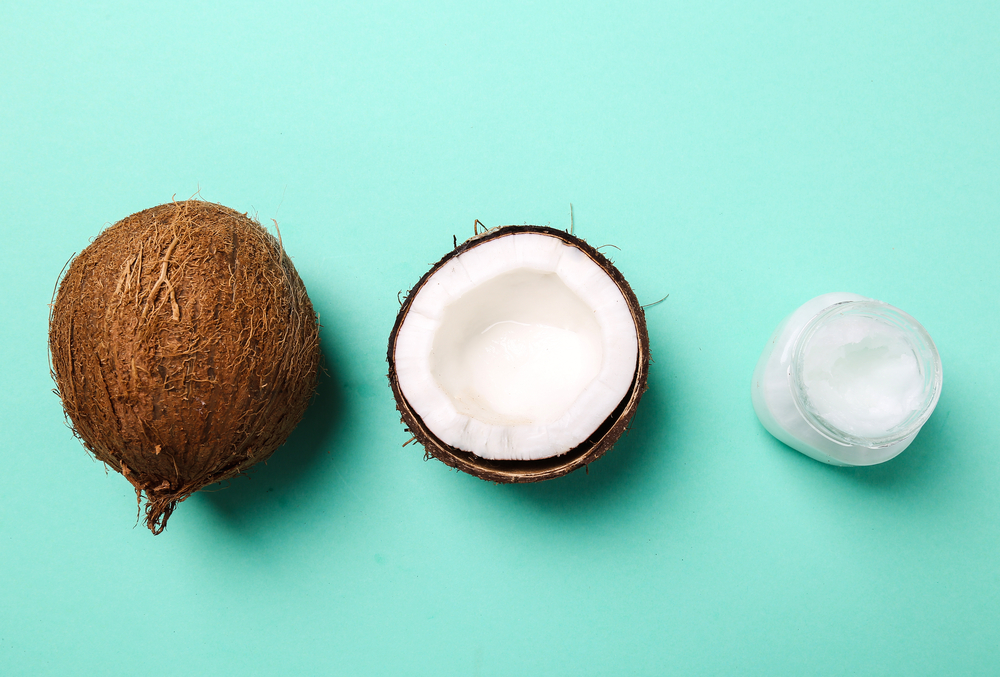By: Amanda Belo
Coconut oil continues to be a trendy, jack-of-all-trades ingredient. From cooking to skincare and haircare, many people swear by this tropical sensation – especially on how it may be beneficial for health – but some disagree entirely! In the midst of all of these claims, we’re taking a closer look on whether coconut oil really is all it’s chalked up to be.
In a New York Times survey featuring public and nutritionist respondents, 72% of Americans believe coconut oil is healthy.[1]
The nutritionists? 37% do not believe coconut oil to be healthy![1]
That’s a significant number! Even the American Heart Association (AHA) has shown some concern about whether or not coconut is as good for consumption as we’ve made it out to be. In fact, in a 2017 advisory the AHA actually advises against the use of coconut oil as it is high in saturated fats![2] So, are health experts on to something that we’re missing or just overthinking things?
What Is Coconut Oil?
Coconut oil comes from the flesh of a coconut and is 100% fat. As a commercial product, coconut oil is consumed in different forms, including virgin and refined and the Philippines serves as its major producer and exporter.[3]
The nutritional breakdown, according to the USDA Nutrient Database, is calorie and lipid heavy with traces of other nutrients. One tablespoon is 121 calories, 13.5 grams of fat and zero grams of carbohydrates, fiber, protein, and sugar.[4]
Possible Nutritive Benefits
- It may raise HDL (“good cholesterol”) levels [3,5]
- Contains medium-chain fatty acids, or MCTs, which absorb quickly in the intestine so the body can use for energy [6]
- Contains a high amount of lauric acid, an antioxidant and fatty acid associated with increasing HDL levels [5]
- As an alternative cooking fat, coconut oil can provide great flavor and a creamy texture, as well as a high smoking point [6]
- Extra-virgin coconut oil contains phytochemicals which may provide health benefits [5]
What do naysayers contend?
Although the conversation in natural health circles is mostly positive around coconut oil’s beneficial effects, many experts believe the results are still inconclusive due to lack of evidence.[3] In September 2018, Harvard professor Karin Michels refers to coconut oil as “pure poison” during a lecture. [7] Although that’s quite the extreme view, the AHA and others in the medical science community have also voiced criticism about the use of coconut oil. With all of the possible benefits that have been claimed for various areas of health, why is it so controversial?
- It’s high in saturated fatty acids
This oil is 80-90% saturated fat, not to mention high in calories! The 2015-2020 Dietary Guidelines suggests limiting calories from saturated fats to “amounts that fit within healthy eating patterns”[8] and the AHA recommends that only 5-6 % of caloric intake should be saturated fats – 13 grams in a 2,000-calorie diet. [9]
- It can affect your cholesterol levels
Even though it may raise HDL levels, it also raises LDL (“bad cholesterol”) levels.[3,5] In some studies, coconut oil helped to raise HDL (our “good” cholesterol) and total cholesterol without necessarily affecting LDL, but that’s not enough support to make a widespread claim. Since other heart-healthy oils have been more directly linked to lowering LDL and total cholesterol, these options may be better alternatives.
- It may not be the weight loss aid it’s made out to be
Talk of coconut oil as a weight loss aid is also big. But at 117 calories and 60% of the daily value of saturated fat per tablespoon, it may not be the golden ticket to weight loss that some believe it to be.A substantial amount of coconut oil’s saturated fat comes MCTs. The good thing is that MCTs absorb quickly in the intestine so that body is more likely to use as energy instead of stored fat. However, for it to have a substantial effect, 100% MCT oil extraction from the coconut oil would need to take place. Processed coconut oil tends to be more readily available than virgin oil. [6]
- Not all coconut oil is created equal
When referring to a product or ingredient, it’s important to note that the way one thing is made can vary from brand to brand depending on factors such as processing, storage, or sourcing location. Different forms of coconut oil could be less healthy than others! Try to avoid partially hydrogenated coconut oil since it is the most processed form and contains trans fats.
Western vs. Asian/Oceanic/PI Diets
Traditionally, coconut is a food staple in Asian and Pacific regions. So, why is the health risk is so low for natives of places like the Philippines or Melanesia if there’s so much fat content in coconut oil?
Evidence suggests that because diets in these cultures tend to contain less processed foods – more fruits, vegetables, and fish as the main protein – the consumption of coconut may not adversely affect their health in the way it might for a typical Western diet – more processed foods, less fresh produce, and saturated fats.[3]
The Verdict: To Eat or Not to Eat?
When it comes down to it, coconut oil is perfectly fine for most to consume but there are a few sticking points. Firstly, moderation is key! Like most things in life, as long as you don’t go overboard and are paying attention to other areas of your diet then a little coconut oil shouldn’t leave you any worse for wear. Secondly, be wary of claims that seem too good to be true – they probably are! While coconut oil can help with a number of things, it isn’t the magic bullet, a cure-all, or a stand-in for traditional medicine when a medical concern is at hand.
Long story short: If you choose to consume it as part of a balanced diet, great! If not, then olive oil comes highly recommended as an alternative oil for everyday use.
This information is not intended to be substituted for professional medical advice.
Contact a health care provider for consultation with questions about a serious medical condition.





Comments (0)